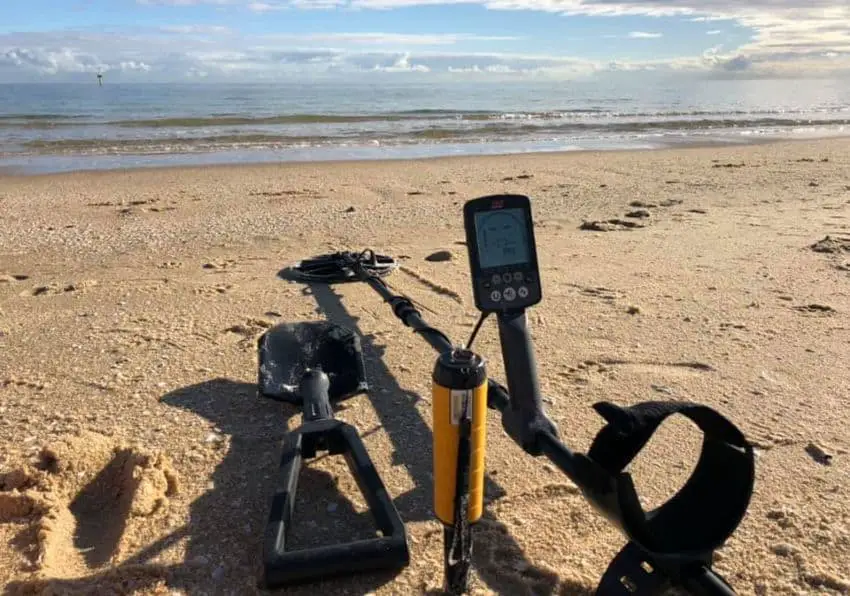
Beach Metal Detecting is 100% the most popular aspect of the hobby. Your chances of picking decent find there in probably the Highest!
However, there are many hobbyists who are not approaching it the right way, at least from what I can see …
… Therefore, I felt I probably should put together a complete article in which I cover all what you should know about this Topic.
I will focus more on the practical aspect by providing actionable tips that you can start implementing right off the bat!
So without any further ado, let’s dive in this subject.
What are the Best Metal Detectors for the Beach?
I’ve seen in many forums and groups that a ton of new hobbyists want to know and learn about the Best machines to search on the beach … Mostly, because this is the only available location where they can use their detector anyway!
I will list 3 good models that you may want to choose from depending on your budget:
1. Bounty Hunter Tracker 4 (The cheaper choice)
![]()
The Bounty Hunter Tracker IV (Check it Here at Amazon) is a great entry-level machine, budget-friendly and has all the basic functions you will need to get the job done.
There are 3 main reasons why I am recommending this model:
- It has a decent discrimination that will allow you to ignore fair amounts of the junk you will find on beaches in general.
- Even if it is considered as a VLF (Very Low Frequency) Model, it still operates on a solid 6.7 kHz which gives the machine a good sensitivity.
- It comes with a waterproof searchcoil, thus you could still use on shallow water and improve your chances to come up with even more finds.
It has a built-in speaker … But while detecting on the beach, I recommend using headphones (Check these Headphones List) to cut out the noise at the beach.
Good to mention, that this model very easy to use … So really ideal if it is your first machine ever.
2. AT Pro (The Popular Choice)
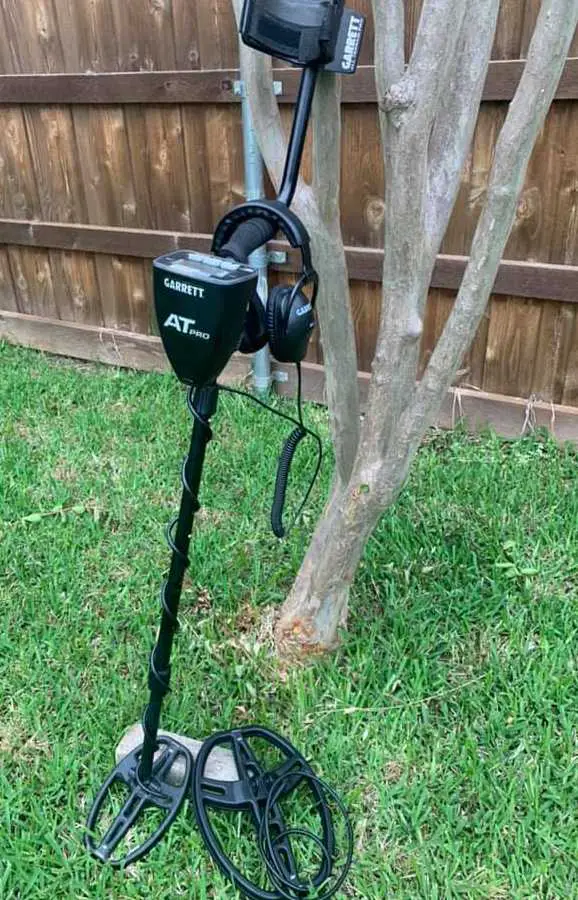
The Garrett AT Pro (Check it Here at Amazon) is one of the most versatile machines when it comes to detecting on the beach. Indeed, it does a good detection job on saltwater and on wet sand.
The AT Pro is also a VLF model that represents several advantages over an entry-level machine for example:
- It operates on a quite high frequency (about 15 kHz) which gives it a significant edge when it comes to smaller targets.
- This model is extremely popular even amongst the most experienced detectorists out there. Thus, it’s very easy to find any info about it, especially for troubleshooting purposes.
- With both manual and automatic ground balancing, it can quickly adapt to the sand ground condition you are dealing with.
- It operates really deep, so if most of your targets are about 10 inches underneath the ground, you will make sure to pick them.
- Fully waterproof up to 10 feet, so, if you are looking to detect underwater, then here you go.
Another good thing about the AT Pro, is the resell price. It is like a Mercedes-Benz, it keeps most of its value over time, and you could resell it for a pretty good price.
3. Equinox 800 (The Best Choice)
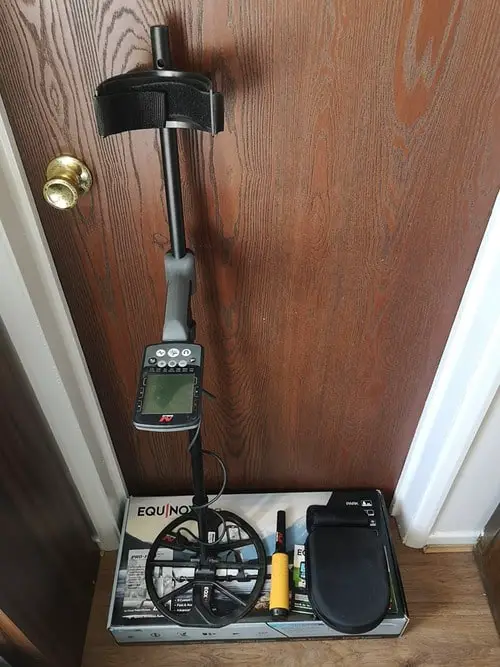
The Minelab Equinox 800 (Check it Here at Amazon) is the better choice, at least, in my humble opinion!
All of the features I listed for the AT Pro are mostly integrated in the Equinox 800. The latter, has even more feature:
- It is multi-frequency model, this means that it can operate on several frequencies at the same time or separately.
- Has a Gold Mode, where it operates at 20/40 kHz. This mode will also allow you to pick it the very small targets.
- Always possible to improve your machine capabilities by updating its software for free, by simply downloading it from the Minelab official website.
- It has a specific Mode Called Beach, where it provides you with the best setting to find stuff there quite easily.
Finally, as you might know, beaches are quite trashy, and things like nails could always potentially be places close to non-ferrous valuable targets like coins for example…
…The Nox 800 comes with a little feature called ‘Iron Bias’, which let you decide whether to pick up targets that are close to junk to just ignore them. This feature is very useful while searching on the beach!
What additional tools you will need to detect on the beach?
A Good Machine is a great way to have success while detecting on the beach, yet it is important to use as set of other tools …
1. Sand Scoop
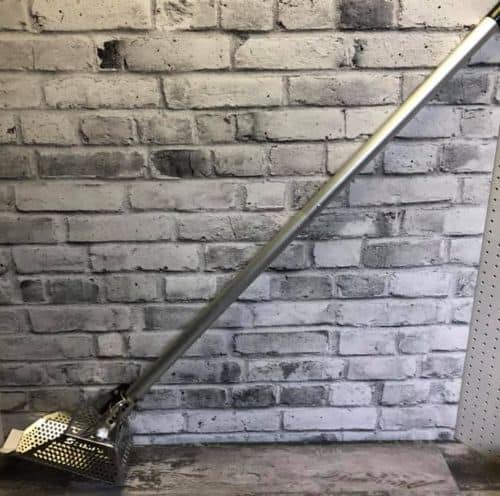
A Sand Scoop (Check it Here at Amazon) will help you recover your finds quickly and easily. You can use a plastic sand scoop if you want but the best material is stainless steel as it is very resistant to being broke.
This tool is particularly helpful when you try to recover targets in wet sand, or in shallow water!
2. Shovel
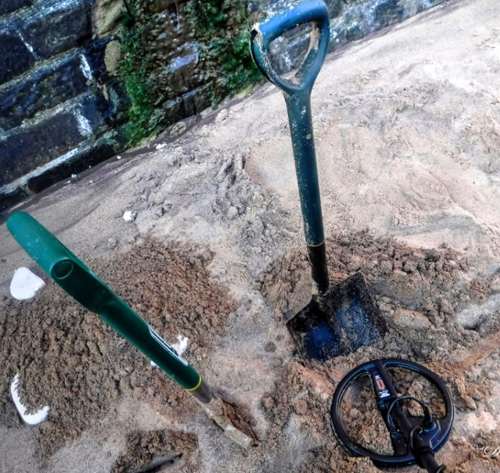
Digging heavy sand with your bare hands all the time is not fun at all! Thus, a quality shovel (Check it Here at Amazon) is really useful …
… Make sure to pick a quality shovel so it will last with you for a long time.
3. Pinpointer
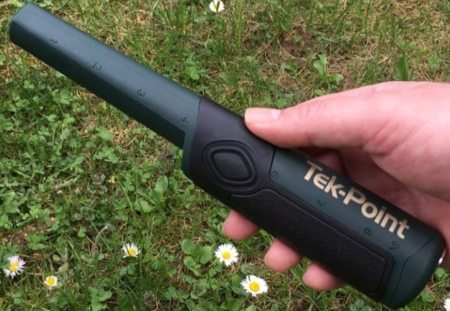
It is very easy to miss on valuable targets that are placed on the same location! To avoid that, you will need a reliable Pinpointer (Check it Here at Amazon) to help you locate all of your finds in any given hole …
… Also, on beaches, you will find yourself in situation where you dig almost all the time. That’s why you will to dig the minimum that you can to make sure you conserve your time and energy … And pinpointers are really helpful to serve such a purpose.
Best Beaches Where you Can use your Detector…
A little Disclaimer: Please make sure before detecting in any of those beaches that you’ve got the necessary permission to do so!
1. Inside the US
Beaches all across the US offer not just breathtaking views, but excellent locations to use your beloved machine and collect some nice finds…
… For example, many detectorists have reported finding rare and valuable coins along the ocean floor in the shallow waters off Florida’s Atlantic coast and the Florida Keys.
Florida’s Treasure Coast, a coastal area, stretching from Fort Pierce to Melbourne, is known for having an endless source of gold and silver coins as well as artifacts Due to this, many detectorists who throng to the beaches here, especially after a storm.
Here are some of the best beaches in the US that you might go for:
- Myrtle Beach, South Carolina
- Kauna’oa Beach, Hawaii
- Clearwater Beach, Florida
- Coronado Central Beach, California
- Ocracoke Lifeguarded Beach, Outer Banks of North Carolina
- Grayton Beach State Park, Florida Panhandle
- Coopers Beach, Southampton, New York
- Hapuna Beach State Park, Island of Hawaii
- Beachwalker Park, Kiawah Island, South Carolina
- Caladesi Island State Park, Dunedin/Clearwater, Florida
- Duke Kahanamoku Beach, Oahu, Hawaii
2. Outside the US
There is no shortage when it comes to beautiful and profitable beaches around the world! Just make sure you’ve got the permission to detect there with no issue.
In Australia
- Bondi Beach in Sydney
- Lizard Island in Queensland
- Byron Bay in New South Wales
- Mandalay Beach in Walpole
- 75 Mile Beach in Queensland
- Noosa Main Beach in Queensland
In UK
- Camber Sands in Sussex
- Durdle Door and Lulworth Cove in Dorset
- Porthcurno beach in Cornwall
- Pentle Bay in Tresco
- Holkham Beach in Norfolk
- Luskentyre Beach in Scotland (Learn more about metal detecting in Scotland or in general in the UK)
In Canada
- Skaha Beach in Penticton, British Columbia
- Parlee Beach in New Brunswick
- Singing Sands Beach in Prince Edward Island
- Cobourg Beach in Ontario
- Manitou Beach in Saskatchewan
- Wasaga Beach in Ontario
In France
- Palombaggia Beach in Corsica
- Étretat in Normandy
- Paloma Beach in Nice
- Cap Coz in Brittany
- Plage de la Côte des Basques in Biarritz
- Prado Beaches in Marseille
In Spain
- Cala Agulla
- Playa De Las Canteras
- Playa Del Cristo
- Playa De La Carihuela
- Cala Comte
- Playa De Bolonia
Tips on to detect on beaches properly …
Now, after we’ve covered the machines and accessories you should consider, let’s, now, tackle some useful tips and techniques you need to take into consideration to make sure you end up successful detecting on sand or saltwater most of the time:
- Always, check whether you need to have a permit before you go for a given beach. Some public beaches may require a license from the local authorities, and in case of private beaches, you may need to approach the owner.
- If you are planning on detecting for a long period of time, then start by setting the discrimination setting to the highest, then start decreasing it little by little until you start noticing junk in the hole you dig. Tweak it around that level until you find the sweet spot!
- Research the tides. Study the tides, so you know the best times to detect.
The high tide shifts the sand around, churning up any potential finds, and then drawing them back into the water. Many detectorists prefer to search immediately after high tide, but you need to be aware of when the tide is coming back in.
- Don’t let the storm stop you. In fact, storms churn up the seas and the beaches, moving things around. This is why many detectorists come out right after a storm.
- Follow the towel line where beachgoers place their towels, typically above the high tide mark. As people dump their belongings here, this is the place where most objects fall off.
Is the beach a good way to start for beginners?
The beach is perhaps one of the best places, if not the best for beginners to start with!
Simply because there is a very high possibility of finding valuable items which boosts the confidence of new hobbyists.
Also, many public beaches don’t require permission unlike State Parks for examples where a permission is requires most of the time.
Finally, it is very common to find other detectorists in there, which is a good thing to have like-minded people around doing the same thing. This makes you feel better.
Is Beach Detecting Profitable?
Surprise, Surprise … Yes!
Beaches attract crowds not only in the summer time but also throughout the year …
So, it’s very easy to come up with lost stuff including jewelry, spendable coins and other stuff … Of course, I always recommend to return those if you know the owner. That’s an ethical thing to consider I would say.
Exploring beaches at night – What you should know …
Sometimes due to the summer heat, many people find metal detecting during the daytime really difficult…
… So instead of risking overheating or getting sunburned, many detectorists prefer to opt for the night.
Below, some tips that you could implement:
- Take a partner: The safest thing is to bring a detecting partner along with you if you are going to the beach at night. Your partner will also help you perform some basic tasks such as digging or holding a flashlight.
- Use the natural light of the moon: The easiest way to detect on the beach at night is to make use of natural light provided by the moon. This is why it is better to pick a night when there is a full moon out.
- Use a pinpointer with a built-in light: Most people already have a pinpointer for beach detecting, but in case you want to detect at night, it is a good idea to buy a pinpointer with a built-in light.
- Have a headlamp handy: You should use a headlamp that can be strapped straight onto your head. They are rather inexpensive and will help light up your way in the dark.
- Go to a familiar beach: It is always better to detect in the night at a familiar location. Even if you are going to a beach for the first time, make sure to check it out during the day so that you are aware of how the layout looks like.
What about on Winter Time?
The winter is not an easy time to en joy the hobby! That’s why most hobbyists tend to take a step back during that time …
… For someone like me that’s an opportunity! In fact, this means less competition which opens the room for more finds.
In addition, during that time winds and even storms would shuffle the objects on the ground and even bring some objects underneath on the surface. This opens even more opportunities that you should consider.
Just make sure you wear properly, use proper gloves, hats …
How does the detector depth change on sand?
Detectors depth is one of the most important features/factors that you should consider before picking up a given model …
… The good news is that detectors tend to see deeper than usual on sand … Simply because there is a lot of air between the sand particles there.
What finds should you expect on beaches in general?
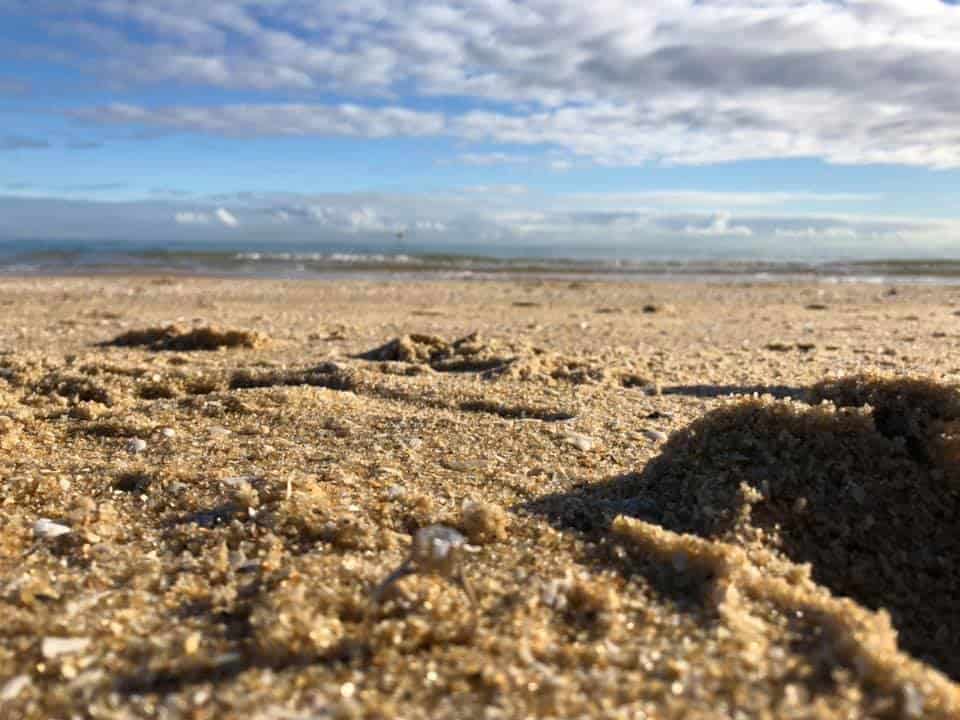
Obviously you should not expect to find relics or any kinds of historical finds … For such you should opt for different locations that have witnessed historical events like battle fields or even ghost towns …
… However, beaches are great for pulling out finds that hold decent value. These are mostly lost stuff such as:
- Rings
- Earrings
- All sorts of jewelry
- Spendable coins
- Watches
- All sorts of Keys
- Bracelets
- …
If you come up with any of these finds, don’t forget to try to find the owner if possible.
Also keep in mind that junk finds are very common, such as:
- Bottle caps
- Belt buckles
- Nails
- …
How are the ground conditions there?
Beach sand is different from regular soil, that’s why not all detectors can operate well in there.
Indeed, there is a lot of air present between the sand particles, making it porous.
Saltwater and the ‘hot rocks’ that you may find at the beach also need to be dealt with. Keep in mind that saltwater further amplifies the normal ground minerals, causing many of the regular land-based detectors to give chatter and provide false signals.
How often a permit is required on beaches?
In most cases, detecting on public beaches does not require you to get a permit!
However, there are certain countries like Greece that requires you to ask for permission. Though, these rules for permission also depends on the beach, meaning that there are specific beaches, such as the ones in Normandy, France, that are archaeologically protected, and you cannot use a metal detector there without having a license.
In countries like Italy, Australia, and the United States, there is no need to get a permit for beach in most cases. Yet, you need to always check beforehand!
In the United Kingdom, you need to get an open permit for metal detecting on all lands (This shouldn’t include your Test Garden) of the Crown Estate.
What part of the beach is best to detect efficiently?
As I’ve mentioned before, following the towel line is generally said to be the best way to search in there.
However, searching is shallow water holds some significant potential too.
Difference between wet and dry sand …
Dry sand hunting focuses on the parts of the beach where seawater does not touch. Most beaches have vast areas of dry sand.
Searching on the dry sandy areas is ideal because most detectors will operate here just fine. It is also very easy to dig up targets in dry sand. However, one drawback is that dry sand tends to be full of trash items, including bottle caps, bobby pins, aluminum cans, etc.
Wet sand, on the other hand, is different because you will need better machines that are designed for hunting in water.
Wet sand basically refers to the area that is touched by water and remains wet. Hunting in wet sand is more labor-intensive than hunting in dry sand. Wet sands also tend to have significantly more valuable finds.
Beach Detecting Books – Recommendations …
Reading books never gets old, at least for me … That’s why I highly recommend to check some solid books to expand your knowledge and learn even more about beach metal detecting.
Below 2 books recommendation:
1. Metal Detecting the Beach By Mark D. Smith
This book (Check it Here at Amazon) has been written by Mark Smith, who is a professional detectorist himself … He provides various helpful tips on how he has found loads of treasure on the beach.
It covers various interesting topics such as how to enjoy this hobby even with children, what type of techniques you should implement and much more … All this well-illustrated by real life pictures.
2. Metal Detecting on the Coast: The Ultimate Guide By Edward Fletcher
This book stands out because it has been written in a flowing and ‘easy to read’ manner, that too in large font size.
The author is experienced and all the tips contained in the book are all tried and tested by the author himself.
If you are a beginner, this book will get you started and boot your confidence!
If you want more of these, have a check at these metal detecting books!
Conclusion
Hope this Posts wasn’t too much long for you! I really wanted to cover all the possible aspect when it comes to detection activities on the beach …
… I believe that this aspect of the hobby is very important and not many people do it properly! Hope this article will get you started on the right path!
I’ve recently written this comparaison between regular detectors and mine detectors! I am sure you will find it useful.
